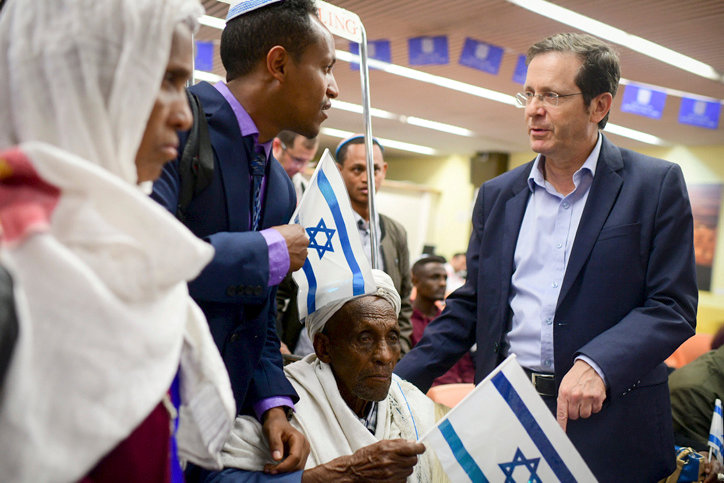‘Aliyah can help Israel out of the COVID crisis’
A year ago, Jewish Agency chairman Isaac Herzog tried to revamp his organization. The coronavirus pandemic upended everything and made aliyah — which has not been as high a priority for the agency as it was in years past — an urgent challenge.
The aliyah figures for August 2020 tell the story. North America saw a 238 percent year-on-year rise in the number of requests to make aliyah. Britain saw a 165 percent year-on-year rise. Applications from South Africa doubled. Overall, twice as many aliyah applications were opened in western nations than in 2019.
“This is the tip of the iceberg,” says Herzog.
“People are afraid for the future in the Diaspora and interested in fulfilling the aliyah dream, he said. “Nine-thousand new immigrants from 70 countries made aliyah during the coronavirus crisis. These are people who need to go into quarantine in a new country where they don’t know the language, sometimes with young children and everything — all to fulfill the Zionist dream.
“Despite all the restrictions, 450 people made aliyah the week before Rosh Hashana, including arrivals from countries it would be better not to mention.”
Herzog said he expects a massive wave of 250,000 new olim over the next three to five years.
“In the early 1990s, we took in about a million olim and they created an enormous change. Israeli society benefited as a whole from that aliyah,” he continued. Of course, it requires practical cooperation between the various government ministries — particularly on issues of housing and incentives to move to the periphery, the Negev and the Galilee. I can tell you that we have mayors and local authority leaders standing in line asking that some of the new olim be directed to their towns.”
Herzog recounted that “based on our experience, every wave of aliyah carries with it economic recovery and growth. This is a huge opportunity for Israel, both in terms of society and the economy.”
All the parameters we have indicate that this aliyah wave, which is just starting, is of rare quality,” he said. “Even now there is demand for twice as many ulpans for young people than currently exist. We need to encourage entrepreneurship, employment and integration into the industrial sector. But for that to happen, I need the government to be a true partner.
“I’m convinced that the moment the government adopts the right plan, aliyah will become one of the tools to help us out of the crisis.”
Fast action is needed to assist Jewish communities that suffered critical blows during the COVID crisis, he said.
“The Jewish community in Italy was the hardest hit at the start of the pandemic. I can’t get something that Ruth Dureghello, president of the Jewish community in Rome, said out of my head: ‘Everything is collapsing around us. We haven’t seen anything like this, other than the Holocaust, in the last 100 years.’
“You hear something like that and you try to think about how to help as quickly as possible. We have an obligation not only to the Jewish communities living there now, but also to preserve the glorious legacy of the Jewish people in the Diaspora.”
Asked whether there is inherent tension between Israel’s obligation to take care of its own needs versus its obligation to the Jewish world, Herzog responded:
“Part of our role is to convince Israeli society and the government that we also have a responsibility for everything that happens in the Jewish world — whether it’s in educating toward unity, the fight against anti-Semitism, or the very connection between Jews and Israel.
“Nothing less than a paradigm shift [has taken place in Israel-Diaspora] relations. If in the past Jewish communities were the ones who helped Israel at times of crisis and war, now Israel is the one that needs to help them and thereby strengthen ties. This is a long-term process.”
Has the COVID crisis suppressed the tensions between Israel and US Jewry?
“The human mosaic is very complex, so it’s hard to answer,” he said. “For example, you can’t ignore the impressive growth in the Haredi population that is taking its place … as well as the challenge that keeps popping up with the young generation, the ones defined as progressive, who are asking complicated questions about Jewish identity and, no less important, how they can bridge that gap. There is an immense love for Israel abroad, which I’ve been exposed to throughout the pandemic, and I see proof of that especially during this crisis, which real concern for Israel expressed in thousands of messages.”
Herzog pointed to a sweet spot — the peace agreements with the United Arab Emirates and the start of normalization.
“That’s an amazing historic development,” he said. “We are already working with the major Jewish communities in the UAE, most of whom are not from there originally. They’re Jews who went there to work.”

 48.0°,
Overcast
48.0°,
Overcast 




